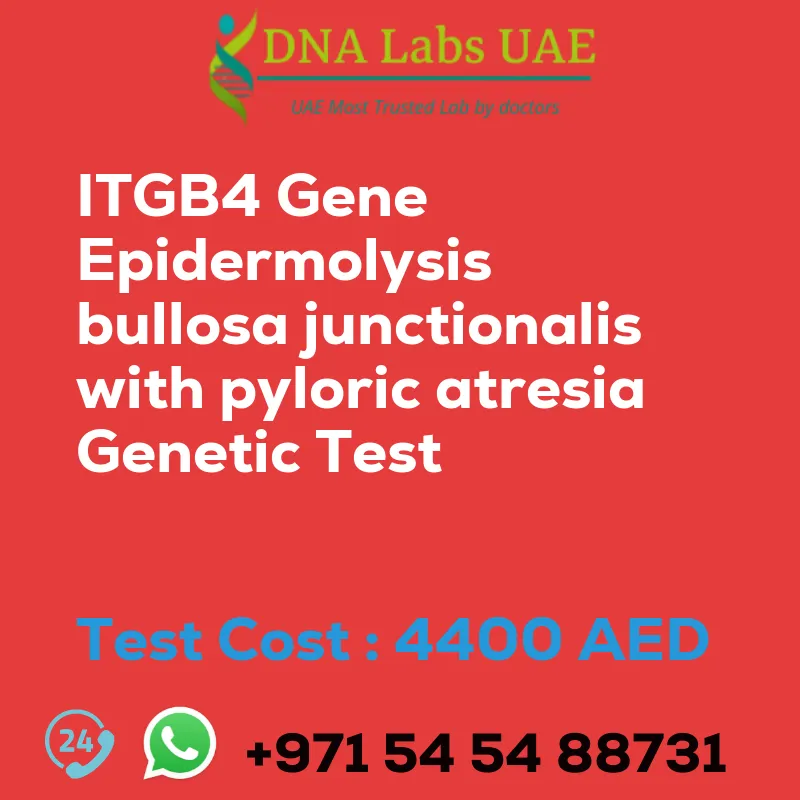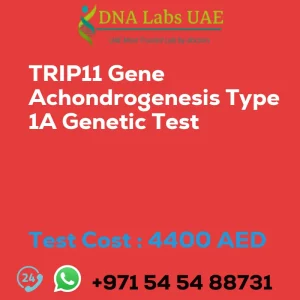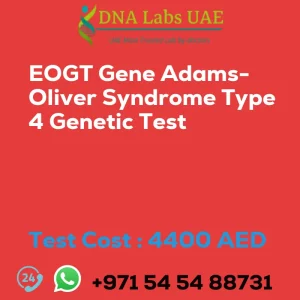ITGB4 Gene Epidermolysis bullosa junctionalis with pyloric atresia Genetic Test
At DNA Labs UAE, we offer the ITGB4 Gene Epidermolysis bullosa junctionalis with pyloric atresia Genetic Test. This test is designed to diagnose the rare genetic disorder known as Epidermolysis bullosa junctionalis with pyloric atresia (EB-PA).
Test Components and Price
The test is priced at 4400.0 AED and requires a blood sample, extracted DNA, or one drop of blood on an FTA Card.
Report Delivery and Method
The test results will be delivered within 3 to 4 weeks. The test is conducted using NGS (Next-Generation Sequencing) technology.
Test Type and Doctor
The ITGB4 Gene Epidermolysis bullosa junctionalis with pyloric atresia Genetic Test falls under the categories of Osteology, Dermatology, and Immunology Disorders. It is recommended to consult with a dermatologist for this test.
Test Department
The test is conducted in our Genetics department.
Pre Test Information
Prior to taking the ITGB4 Gene Epidermolysis bullosa junctionalis with pyloric atresia Genetic Test, it is important to provide the clinical history of the patient. Additionally, a genetic counseling session will be conducted to draw a pedigree chart of family members affected by the disorder.
Test Details
The ITGB4 gene is associated with Epidermolysis bullosa junctionalis with pyloric atresia (EB-PA). This disorder is characterized by the presence of blisters on the skin and mucous membranes, as well as the narrowing or closure of the passage between the stomach and small intestine (pyloric atresia).
NGS genetic testing is a cutting-edge technology that allows for the analysis of multiple genes simultaneously. In the context of EB-PA, NGS genetic testing can identify mutations or variations in the ITGB4 gene that are associated with the disorder. By analyzing the ITGB4 gene through NGS, healthcare professionals can determine if there are any genetic abnormalities causing the symptoms of EB-PA in an individual.
NGS genetic testing may not be available in all healthcare settings and is typically performed by specialized laboratories. The availability, cost, and turnaround time of the test may vary depending on the healthcare provider and country. It is recommended to consult with a healthcare professional or genetic counselor for more information about the availability and specifics of the NGS genetic test for EB-PA.
| Test Name | ITGB4 Gene Epidermolysis bullosa junctionalis with pyloric atresia Genetic Test |
|---|---|
| Components | |
| Price | 4400.0 AED |
| Sample Condition | Blood or Extracted DNA or One drop Blood on FTA Card |
| Report Delivery | 3 to 4 Weeks |
| Method | NGS Technology |
| Test type | Osteology Dermatology Immunology Disorders |
| Doctor | Dermatologist |
| Test Department: | Genetics |
| Pre Test Information | Clinical History of Patient who is going for ITGB4 Gene Epidermolysis bullosa junctionalis with pyloric atresia NGS Genetic DNA Test. A Genetic Counselling session to draw a pedigree chart of family members affected with ITGB4 Gene Epidermolysis bullosa junctionalis with pyloric atresia NGS Genetic DNA Test gene ITGB4 |
| Test Details |
The ITGB4 gene is associated with a rare genetic disorder called Epidermolysis bullosa junctionalis with pyloric atresia (EB-PA). This disorder is characterized by the presence of blisters on the skin and mucous membranes, as well as the narrowing or closure of the passage between the stomach and small intestine (pyloric atresia). NGS (Next-Generation Sequencing) genetic testing is a type of genetic testing that uses advanced sequencing technologies to analyze multiple genes simultaneously. In the context of EB-PA, NGS genetic testing can be used to identify mutations or variations in the ITGB4 gene that are associated with the disorder. By analyzing the ITGB4 gene through NGS, healthcare professionals can determine if there are any genetic abnormalities that may be causing the symptoms of EB-PA in an individual. This information can be useful for diagnosis, genetic counseling, and management of the condition. It’s important to note that NGS genetic testing may not be available in all healthcare settings, and it’s typically performed by specialized laboratories. The specific details of the test, including its availability, cost, and turnaround time, may vary depending on the healthcare provider and the country in which the testing is performed. It is best to consult with a healthcare professional or genetic counselor for more information about the availability and specifics of the NGS genetic test for EB-PA. |








